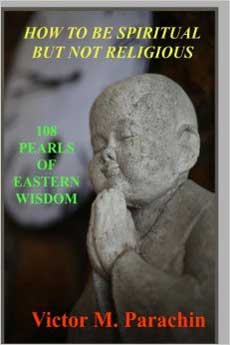Victor M. Parachin is a yoga and meditation teacher. He has a Master's degree in religion from the University of Toronto and is the author of numerous books about eastern practices and spirituality. He is on the faculty of Yoga Spirit Academy, a yoga teacher training program.
We have given Parachin two S&P Book Awards — in 2007 for Eastern Wisdom for Western Minds, which models hospitality as a way for Christians to enrich their faith with the principles and practices of Eastern religions, and in 2012 for Eleven Modern Mystics and the Secrets of a Happy, Holy Life, an impressive book with an interspiritual flair and a deep appreciation for mysticism.
As Parachin states in the introduction to this book, we are seeing an increase in the number of people who call themselves spiritual but not religious. Parachin has discovered great meaning in Eastern approaches to spirituality as found in yoga, meditation, and Buddhist teachings. He contends that because these teachings are "inherently flexible and flowing, they allow you to combine them with one another as well as with your cultural and religious background allowing you to produce your own unique spiritual hybrid."
Since ancient times, people have had yearnings for something more. Today we are seeing the same quest for meaning. We are joining a conversation that has been going on for 3,000 years. Reading the 108 pearls of Eastern wisdom Parachin has gathered for us here, we are thankful for his use of questions as an essential practice on the spiritual journey; they are powerful allies that can stretch our minds, bodies and souls.
Here are some questions the author suggests as part of a "Spiritual Self-Examination":
"• How well am I living?
• How well am I loving?
• How well am I forgiving?
• How well am I letting go?
• What is my true nature?
• What is my purpose for being here?
• What am I doing and why does it matter?
• What is my contribution to others?"
Parachin has a special fondness for paradox, selfless giving, and going with the flow of the present moment. Some of these qualities are part of his "Ten Zen Commandments":
"1. Pay attention.
2. Awaken your mind.
3. Open your heart.
4. Follow your own light, not someone else's.
5. Don't cling to anyone or anything.
6. Be flexible: not too tight, not too loose.
7. Be mindful: be here while moving there.
8. Practice compassion.
9. Meditate as often as you can.
10. Choose joy."
Those of us on the wisdom path share a love of quotations as a firm foundation for our multidimensional quest for meaning. Parachin never fails to come up with soul-shaping quotes from unusual sources. In this book you will find gems from Dr. Seuss, Swami Rama, Swami Sivananda, Alfred North Whitehead, and many others.
The tools of wisdom highlighted in How to Be Spiritual But Not Religious are as varied as our quest for the Holy Grail: reading, personal experiences, inner exploration, spiritual practice, conscience, creativity, and devotional exercises. Wisdom is life's gift to us, and we are fortunate to have spiritual teachers like Parachin who keep their eyes and hearts open to her manifold and often surprising comings and goings.
